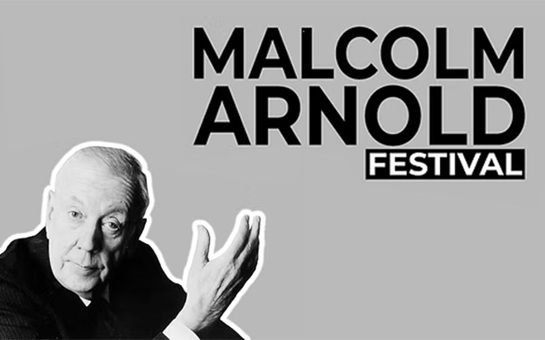- Malcolm Arnold
Concerto for Guitar & Chamber Orchestra (1959)
- Novello & Co Ltd (World)
Programme Note
If there were anybody who still holds the belief that to write well for the guitar a Spanish surname is the sine qua non, they would probably consider Malcolm Arnold’s Concerto to be an anomaly. As it is, the Concerto is a triumphant demonstration of the versatility of the guitar, and it is not surprising that many guitarists (including myself) consider it to be one of the finest concertos in the repertoire. Very few composers, if any, have exploited the guitar’s chameleon-like characteristics and facility for allusion with such skill – its ability to go from lyricism to drama, from light-hearted joke to serious comment, the fluid personality that allows it to assume innumerable masks.
Instead of drawing from the usual Spanish well (and fishing out the usual trite clichés) Arnold chooses to take jazz as a source (at the very least, an equally valid idiom for the instrument). In fact the second movement could well be titled ‘Blue Scherzo in memorium Django Reinhardt’: seldom has the guitar been given such a wealth of emotion as in the slow sections, and the way in which it is made to hold its own against the brass instruments is a minor prodigy of orchestral mastery. The swift break into an impish and wildly virtuosic scherzo is nothing short of breath-taking. The slow movement looms largest in the memory, as it does in length – taking up about half of the entire work – but there is also much to be found in the other two movements. Arnold uses Greek models as the basis for his harmony and melody; in the first movement, a sonata form, the two main themes are each in a different mode. The mode chosen for the second theme (probably the catchiest tune in a work full of them) is the familiar major scale; rhythmic verve and lyricism here strike a perfect balance. The third movement, a rondo, begins with the main theme presented by the solo guitar; the canonic writing for the instrument is bold indeed. The guitar retains a leading role throughout all the episodes, bringing the concerto to a close with an astonishing glissando.
© Eduardo Fernández
Instead of drawing from the usual Spanish well (and fishing out the usual trite clichés) Arnold chooses to take jazz as a source (at the very least, an equally valid idiom for the instrument). In fact the second movement could well be titled ‘Blue Scherzo in memorium Django Reinhardt’: seldom has the guitar been given such a wealth of emotion as in the slow sections, and the way in which it is made to hold its own against the brass instruments is a minor prodigy of orchestral mastery. The swift break into an impish and wildly virtuosic scherzo is nothing short of breath-taking. The slow movement looms largest in the memory, as it does in length – taking up about half of the entire work – but there is also much to be found in the other two movements. Arnold uses Greek models as the basis for his harmony and melody; in the first movement, a sonata form, the two main themes are each in a different mode. The mode chosen for the second theme (probably the catchiest tune in a work full of them) is the familiar major scale; rhythmic verve and lyricism here strike a perfect balance. The third movement, a rondo, begins with the main theme presented by the solo guitar; the canonic writing for the instrument is bold indeed. The guitar retains a leading role throughout all the episodes, bringing the concerto to a close with an astonishing glissando.
© Eduardo Fernández
Media
Concerto for Guitar and Chamber Orchestra, Op. 67: I. Allegro maestoso
Concerto for Guitar and Chamber Orchestra, Op. 67: II. Lento
Concerto for Guitar and Chamber Orchestra, Op. 67: III. Con brio
Scores
Reviews
Discography
More Info

- All 20 of Arnold's Concerti at the 2025 Malcolm Arnold Festival
- 17th October 2025
- For the 20th edition of the Malcolm Arnold Festival all 20 of the composer's concertos will be performed across the weekend.

 Located in the UK
Located in the UK
 Located in the USA
Located in the USA
 Located in Europe
Located in Europe
